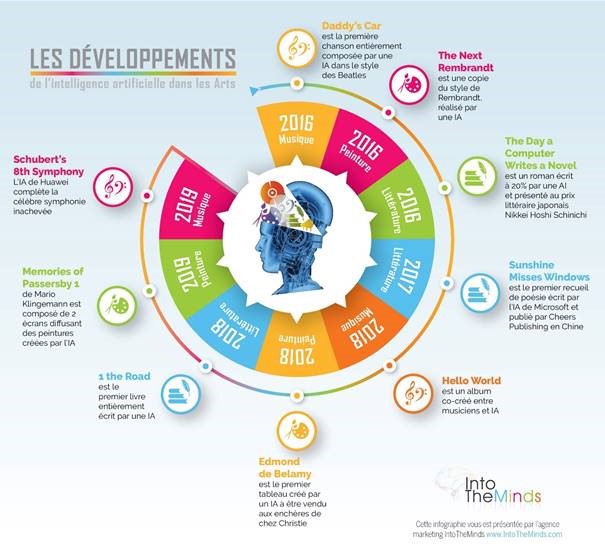



What role for AI in the creative industry ?

Along with deep learning and the development of big data technologies, artificial intelligence (AI) has taken a decisive step forward.
Tomorrow more than ever, AI will be at the core of mankind’s development, significantly impacting our daily lives.
Who can still doubt that “self-driving” vehicles are well on their way to becoming a reality?
So, what could be the role of AI in the creative industry? Should we expect to see machines supersede humans, here too?
According to a recent research study led by the New European Media association1, AI already plays an important role in the creative industry, which could even pioneer the movement.
Technological developments keep pushing back the boundaries of intelligent systems in creative applications. The movie Sunspring, released in 2016 to great critical acclaim, was entirely written with the help of AI. Two years later, Hello World, the very first musical album produced using AI, was presented to the public.
The huge amount of daily content creation, production, distribution and consumption through online platforms – be it text, images, videos and sounds –, opens up further opportunities in terms of AI.
This growth is also fueled by the development of software tools and open source games, as well as low-cost digital platforms. Young businesses are using technological solutions of this nature to create their first prototypes more efficiently. The same is true of any practitioner seeking to incorporate AI into his or her personal projects (artists, researchers, …).
If AI is now ubiquitous in most fields of application for creative industries (music, visual arts, screenwriting, book publishing, movies, video games, news, …), we are left with important questions about its operational role and wider challenges.
1. New European Media. (2019). AI in the media and creative industries.
Last update on : 20.04.2020
The fact remains that AI is involved at each stage of the creative process:
Creation : refers to the artistic act of crafting fresh media content. It may be the case of a sound designer creating new sounds for a specific scene of an action game or a visual artist exploring image generation until he finds out which picture suits his artistic work best
Production: refers to how media content is edited or composed for the purpose of deployment or delivery. Consider the case of a video editor who manually selects and annotates scenes before getting into the process of editing, or a music producer who must balance the different sound tracks of multiple musical instruments.
Consumption: refers to how a final user interacts with a given multimedia content. Take the example of someone who receives a music recommendation on an audio streaming platform or of another person who checks his news feed on a mobile application.
Last update on : 20.04.2020
On the 4th and 5th of September 2018, the BBC itself broadcasted a TV program entirely made by AI.
The show, aired on the thematic channel BBC4 (the equivalent in the UK of Arte), reviewed the latest advances in artificial intelligence, but most of all, put forward the vision of a program designed by an algorithm.
“Made by Machine” is a show produced with the support of the BBC R&D department. It features an hour-long film produced by an AI system, itself programmed to piece together excerpts of BBC archives.
This was a first for the TV channel, which intended to demonstrate the existing capacities of artificial intelligence in terms of TV production.
A real technological challenge, the project can be summarized in three steps:
Last update on : 20.04.2020
According to Pierre-Nicolas Schwab, PhD in Marketing (Solvay Business School) and Director of “InTheMinds”, “what the show revealed to those who watched it, is that there is still a long road ahead for technology to supersede humans. Certainly, “Made by Machine” was nowhere near perfect. Technically speaking, not only were the transitions between scenes questionable, the editing itself resulted in a seemingly disjointed film. More than the existence of any real narrative, the biding thread was to be found in the set of locations represented. In other words, if the algorithm developed for the task could successfully retrieve audiovisual fragments corresponding to a specific location or person, it is still far from being able to craft a compelling story from such raw materials. Creativity is therefore what AI is lacking and this is why mankind is not likely to lose its central place in society any time soon.”
Last update on : 20.04.2020